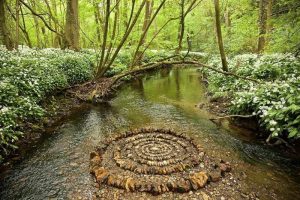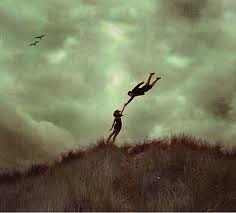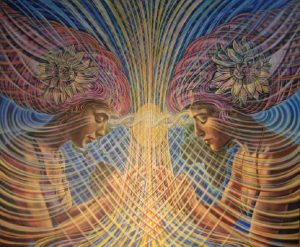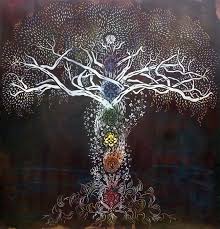 Our Moving into Meditation class continues to draw inspiration from Frank Ostaseski’s wonderful book about living with the awareness that we’re going to die. His book distills what he’s learned into Five Invitations we can answer in living a conscious life. In today’s class we explored the workings of memory. Our fallible memories inform our life stories. They can keep us rooted in the past while strongly defining our present. Frank suggests that bringing “don’t know mind” to our memories and stories can be profoundly healing.
Our Moving into Meditation class continues to draw inspiration from Frank Ostaseski’s wonderful book about living with the awareness that we’re going to die. His book distills what he’s learned into Five Invitations we can answer in living a conscious life. In today’s class we explored the workings of memory. Our fallible memories inform our life stories. They can keep us rooted in the past while strongly defining our present. Frank suggests that bringing “don’t know mind” to our memories and stories can be profoundly healing.
Guided Contemplation
Welcome to this moment . . . feel being . . . breathing . . . resting . . . releasing . . . gradually unharnessed from any preoccupation other than this now . . .
Poet Jane Hirshfield writes of the Harness with these simple lines:
 Little soul,
Little soul,
you and I will become
the memory
of a memory of a memory.
A horse
released of the traces
forgets the weight of the wagon.
Together we can free ourselves from the weight of our wagons . . . simply being . . . breathing . . . resting . . . releasing . . . What is it that we carry? Are we bearing painful burdens? Are we hoarding provisions for the future? When do our notions of self and ideas about others become too heavy to hold? How do our life stories keep us alive? Are we not all becoming a memory of a memory of a memory as the years pass?
In his book, Consolations, David Whyte writes:
Memory is not just a then, recalled in a now, the past is never just the past, memory is a pulse passing through all created life, a wave form, a then continually becoming other thens, all the while creating a continual but almost untouchable now. . . . memory passes through an individual human life like a building musical waveform, constantly maturing, increasingly virtuosic, often volatile, sometimes overpowering. . . . Memory is an invitation to the source of our life, to a fuller participation in the now, to a future about to happen, but ultimately to a frontier identity that holds them all at once. Memory makes the now fully inhabitable.
Frank O. writes:
. . . Human memory . . . is a . . . complicated, subtle and beautiful process. . . . memory is not objective, truthful, exact, or by any means permanent. Our memories are malleable constructs. One study demonstrated that every time we  remember something, our brain networks change in ways that alter our recall of the original event. . . . Eventually the memory of an event can grow so imprecise that it becomes totally false.
remember something, our brain networks change in ways that alter our recall of the original event. . . . Eventually the memory of an event can grow so imprecise that it becomes totally false.
. . . we have always been forgetting. Our memories are constantly being rewritten. Memory fails. This is part of the process of being alive. Best, then to focus on remembering what matters most. Not the details of dates or conversations, but that we are loved and that we are capable of loving others. When there is full acceptance of our not knowing, instead of fear, when we stop insisting that reality should be otherwise, then we can relax with things as they are.
And here we are: either relaxing with things as they are or perhaps feeling the tug of anxiety or fear as we sense the life experiences that seem to be slipping through our fingers – ephemeral . . . transient . . . ungraspable. We may rest on the surface or be fully immersed in the waters of not knowing. We may be treading the waters of uncertainty.
Frank O. writes:
Telling our stories and having others listen is a powerful way to gain new understandings and fresh perspectives on our lives. Once we realize that we don’t recall our memories with any reliable accuracy, then we can free ourselves to tell the stories we need to tell. . . . the point of stories is take the separated, isolated, broken pieces of our lives and in telling them produce moments of wholeness.
 When we share our stories. . . We open ourselves to don’t know mind and allow a deeper part of ourselves to come forward and speak.
When we share our stories. . . We open ourselves to don’t know mind and allow a deeper part of ourselves to come forward and speak.
. . . When we dwell on and retell a story, this unquestioned recirculating of memories can lodge old suffering even more deeply in our minds, causing the present to be defined by our past. When we observe our present reactions with compassion, we are able to release ourselves from the grip of old wounds. . . . by looking at our interpretations, shifting our perceptions and discovering new meanings . . . We can become aware of the memories . . . holding us back, then we can let go.
. . . When we tell our stories, we heal. When someone listens to our stories we heal. . . . Most real-life stories don’t have clear beginnings and endings. . . . they help us make sense of life and embrace its mystery. Through stories we knit ourselves together as a family, community and culture, joining ourselves with the larger human story.
 The moments we spend in mindfulness practice may be a way of fertilizing our ground of being so that it might grow our capacity to listen deeply to ourselves and others. Tiny buds of deeper truths may sprout through the cracks in our old self-defining stories. In mindfulness meditation we come to recognize the amazing complexity and subtly of the human mind which is consciousness. In this miracle of being alive, we share human consciousness. In our practice we experience dimensions of mind beyond memory, we touch present experience with a sense of wonder. Don’t Know Mind. We are aware right now! Beyond thought, feeling and action. Frank writes: Everything comes and goes in awareness. That is the ground of who we are.
The moments we spend in mindfulness practice may be a way of fertilizing our ground of being so that it might grow our capacity to listen deeply to ourselves and others. Tiny buds of deeper truths may sprout through the cracks in our old self-defining stories. In mindfulness meditation we come to recognize the amazing complexity and subtly of the human mind which is consciousness. In this miracle of being alive, we share human consciousness. In our practice we experience dimensions of mind beyond memory, we touch present experience with a sense of wonder. Don’t Know Mind. We are aware right now! Beyond thought, feeling and action. Frank writes: Everything comes and goes in awareness. That is the ground of who we are.
Poet David Wagoner writes:
Stand still.
The trees before you and the bushes beside you are not lost.
Wherever you are is a place called Here,
 And you must treat it as a powerful stranger,
And you must treat it as a powerful stranger,
Must ask permission to know it and be known.
The forest breathes. Listen. It answers,
I have made this place around you,
If you leave it you may come back again saying Here.
No two trees are the same to Raven.
No two branches the same to Wren.
If what a tree or a bush does is lost on you,
You are surely lost. Stand still. The forest knows
Where you are. You must let it find you.
